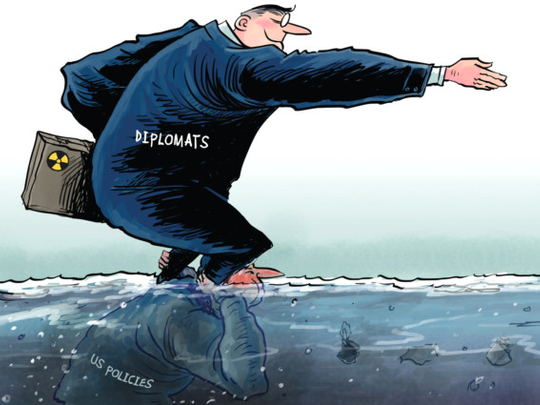
By the time this column is published there may be a nuclear deal with Iran. Or the talks may have fallen apart. Or everyone may still be talking. What will not have changed is the visceral opposition to any achievable deal on the part of a not-insignificant portion of the American political establishment.
Some of this stems from different views of the goal of the talks.
There are many in the United States for whom any deal that does not completely dismantle Iran’s nuclear programme is, by definition, a bad deal.
The Obama administration has long taken the more realistic view that since Iran is unlikely to negotiate away its entire nuclear programme, the goal has to be an agreement that slows Tehran’s technological progress enough to give the rest of the world a year or so to react to any decision to build a bomb.
This would surely be an improvement over the current presumption that Iran’s so-called “breakout period” sits at two or three months, but it is not remotely the same thing as removing every trace of nuclear technology from the country.
A big element of the controversy, however, is over something much more basic: whether the US should be talking to Iran at all (or, as some might put it, whether Iran has earned the privilege of talking to the US). A surprisingly large number of Americans see talking with America as a kind of reward for international good behaviour (as defined, of course, by the Americans themselves). Diplomatically speaking this does not make a lot of sense. As many statesmen have pointed out over the years, one does not make peace with one’s friends. Yet the attitude persists — and Iran is not the only diplomatic front on which it has recently been in evidence.
When the White House announced on July 1 that the US and Cuba will reestablish formal diplomatic relations and open embassies in each other’s capitals it was not only Republicans who objected. Senator Robert Menendez of New Jersey, a Democrat, Cuban-American and former chairman of the Senate Foreign Relations committee issued a blistering statement denouncing the Obama administration.
An American embassy in Havana, he said, means that the Castro government “is being rewarded while... our demands for freedoms and liberty on the island will continue to be ignored and we are incentivising a police state to uphold a policy of brutality.”
Menendez continued: “It is long past due for the United States to require concessions and changes from Cuba and, thus far, we have seen neither.”
In other words: no embassy should have been established without a fundamental change in Cuba’s social system. One hears similar language among people who claim to support a ‘good’ deal with Iran but who define ‘good’ as Iran changing its entire system of government and recognising Israel. Last week the No. 2 Republican in the US House of Representatives, Kevin McCarthy, wrote an article for the Washington Post criticising any lifting of sanctions not specifically focused on the nuclear programme.
‘Verifiable performance’
“Sanctions are what brought Iran to the table in the first place... any deal that explicitly or implicitly gives the Iranians sanctions relief on anything other than the country’s long-term and verifiable performance on its obligations is a bad deal.”
Many in the US Congress and in Washington’s more right-of-centre think tanks support Israeli Prime Minister Benjamin Netanyahu’s demand that any nuclear deal ought to include Iranian recognition of Israel. Surveying the Vienna talks one Fox News columnist, former Nixon and Reagan-era national security official K.T. McFarland, wrote “I’m convinced that a savvy mum could negotiate a better deal than our experienced diplomats.”
The problem with this way of thinking is the underlying presumption that American diplomatic recognition is a reward for good behaviour (or at least for behaviour of which the US government approves) rather than a simple tool by which sovereign states communicate, regardless of whether or not they actually like each other.
At the risk of stating the obvious, the US has diplomatic relations with a lot of countries whose governments it does not particularly like and Washington is home to more than a few embassies representing nations that are not particularly friendly to American policies.
That is normal. It is how diplomacy works. Moreover, it is a system that, by keeping lines of communication at least minimally open, helps reduce global tensions, however imperfectly.
The US remains the most powerful country in the world, but as the last 25 years have made clear neither its economic nor its military power guarantee that Washington will always get its way. No one doubts that most of the time the State, Defence and Treasury Departments understand that. The question is when Congress and the more ideological end of the media and think tank worlds will get the message too.
Gordon Robison, a longtime Middle East journalist and US political analyst, teaches political science at the University of Vermont.










